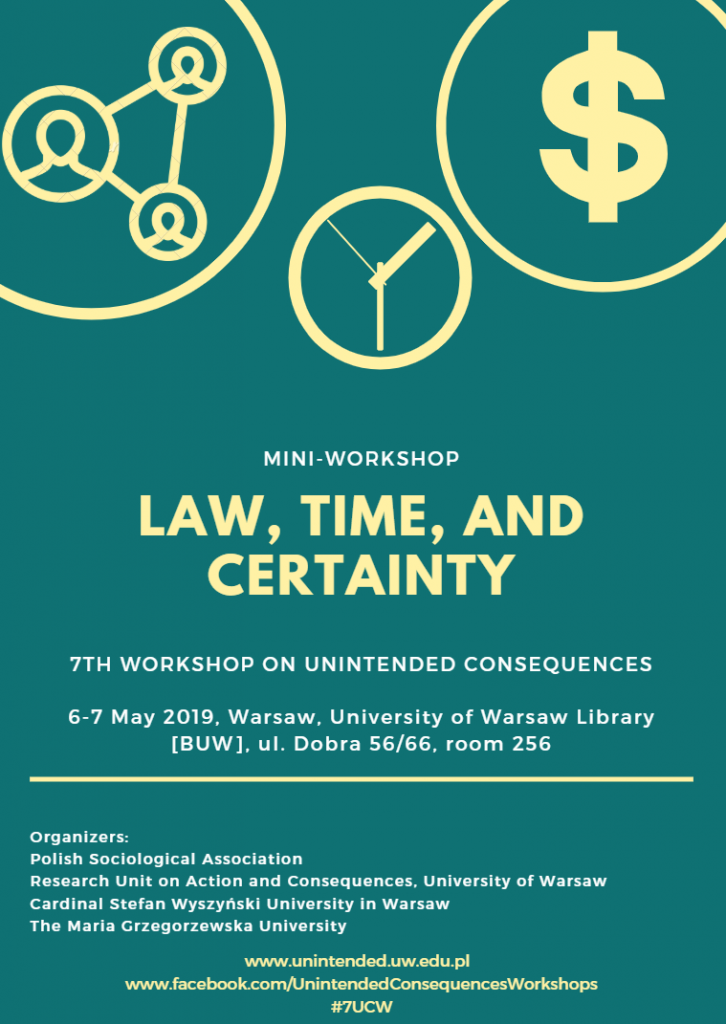 CALL FOR PAPERS
CALL FOR PAPERS
Law, time, and certainty
Mini-workshop
Deadline for abstract submission: 15 December 2018 (see details HERE)
Organizers: Karol Muszyński (University of Warsaw, muszynskikarolATgmail.com), Jan Winczorek (University of Warsaw, janwinATjanwin.info)
For a long time, law was treated as codified memory of appropriate ways of conduct. Past events were the main point of reference for thinking about normativity. The emergence of “future-oriented” legislation cancelled the necessity of temporal embeddedness – statutory laws, public policies, and administrative recommendations could exist without the past. However, since regulation is unable to predict the events in the future that will require its reaction, law and its particular applications (such as contracts) are often seen as somewhat redundant attempts to control the future, or even worse: as conservative forces „freezing” the active body of the society.
However, the relationship between law and time becomes increasingly complex and multi-dimensional. On one hand, law still primarily serves as “time-binding” device, ensuring that if certain conditions are met, one might expect that particular outcome will be provided, and in the worst case scenario – imposed. Law stabilizes the present with the expectation of the future. New problems have however emerged. First, technical and legal ones: if controlling the future is not possible, how should we draft the regulations? Is it better to stick to clearly expressed “rules” that supposedly require no interpretation, or maybe it’s better to give courts and regulatory agencies more freedom in applying the regulation with vague “standards”? Is it possible to go beyond the static vision of past-law-controlling-the-future, to regulate in a way that is more reactive or reflexive? Does giving more flexibility in application of the law does not undermine its primary function of providing certainty? Given that uncertainty regarding normativity permeates all actors in the society, how does it in the end influence the individual processes of using the law?
Moreover, the past has made a sudden return to the law. New developments in sociological and political studies have shown that issues such as lock-in effects and path dependencies play a fundamental role not only in drafting the law, but also in the way it practically functions. The need to bring historical analyses to implementations of policy changes does not reduce the usual uncertainty around the effects of regulation. Moreover, due to re-discovered problems of historical injustices, legal tools are increasingly used to control the past as well. Transitional justice stands out as an attempt to control the past normativity with the use of contemporary one.
The above mentioned problems certainly do not cover all the problems regarding the temporal dimension(s) of the law. Mini workshop welcomes submissions, both empirical and theoretical, that attempt to highlight the role of temporality in all processes concerning the law, such as: interpreting the law, using it actively (concluding contracts, starting disputes), drafting legislation, implementing policies, etc.
See also Important Dates and Registration
More information about mini-workshops is available HERE.
Mini-workshop “Law, time, and certainty” is a part of the 7th Workshop on Unintended Consequences “Time is Money, and Beyond: The Temporality of Action and Consequences“, 6-7 May 2019, Warsaw, Poland.